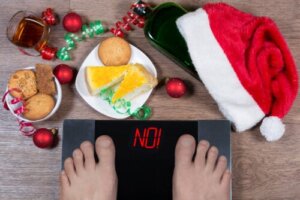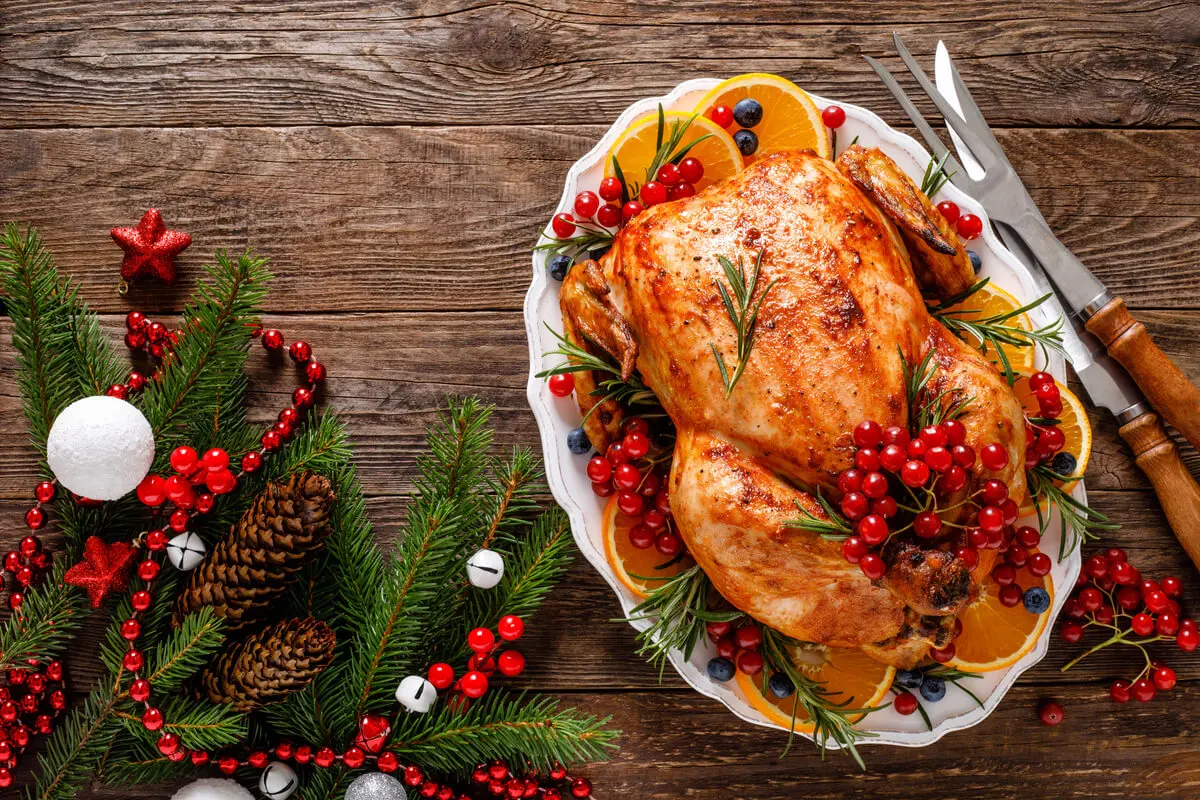How to Avoid Cholesterol Spikes During and After the Holidays


Reviewed and approved by the doctor Leonardo Biolatto
Cholesterol spikes have become a cause for concern during the holiday season. Excessive intake of unhealthy foods, sedentary lifestyles, alcohol consumption, and even the emotions typical of these dates are linked to alterations in the lipid profile and an elevated risk of heart problems.
A study published in the journal Atherosclerosis warns that, during this time of year, total and LDL cholesterol levels tend to be higher. In fact, celebrating Christmas is associated with an increased risk of hypercholesterolemia in the general population. Weight gain, obesity, and diabetes worsen the prognosis. So, how can this be avoided?
The relationship between Christmas parties and cholesterol spikes
We speak of cholesterol peaks when the levels of this fatty substance increase in the blood. The ideal situation is for “bad” cholesterol (LDL) to remain at levels below 130 mg/dL. In addition, it should be less than 100 mg/dL in those who have had a previous cardiovascular event.
Meanwhile, it’s advisable to keep total cholesterol in a range below 190 mg/dL, while good or high-density lipoprotein (HDL) cholesterol should be higher than 40 mg/dL in men and 50 mg/dL in women.
When these levels are altered, the risk of cardiovascular events rises considerably. Myocardial infarction (heart attacks), strokes, and angina are some of the most frequent consequences.
Often, holiday parties involve changes in routine that impact cholesterol spikes. Large, high-calorie meals, the consumption of alcoholic beverages, and physical inactivity lead to an accumulation of this substance in the arteries.
And although 85% of cholesterol is produced in the liver and its levels are conditioned by genetic factors, it’s a fact that bad habits can lead to alterations that put health at risk. Hence the importance of maintaining a healthy lifestyle, even in times of celebration.
We think you may also like to read this article: How to Enjoy an Inclusive Christmas
What does the research say?
Consultations and emergencies related to cardiovascular health increase both in the last weeks of December and in the first weeks of January.
Cholesterol tends to rise by up to 10% in people who have overeaten during Christmas. According to experst, this is registered in up to 50% of the population.
Research shared through the International Journal of Environmental Research and Public Health reported that, after holiday vacations (both Christmas and Easter), men may experience a 4.6% increase in total cholesterol levels and women a 13.46% increase in triglycerides.
The researchers believe that these changes in the lipid profile are linked to seasonal dietary changes. In any case, this is a subject that requires further study.
For its part, a compilation of studies by the Spanish Society of Cardiology (article in Spanish) found that there’s an increase of up to 5% in deaths of cardiac origin during vacation periods, specifically during Christmas and New Year’s.
It also details that it is more likely to be admitted to emergency rooms for heart failure on the 4 days following Christmas or New Year’s Day. High consumption of fat and sodium, excessive consumption of alcoholic beverages, emotional stress, and exercise at low temperatures are factors linked to these problems.
Misinterpretation of cardiac symptoms also plays a role in these fatal outcomes. Normalizing clinical manifestations with thoughts such as “it’s just bad digestion” or “it’s just stress” prevents timely attention.

Tips to avoid cholesterol spikes during the Christmas holidays
Before knowing some recommendations to avoid cholesterol peaks during the Christmas holidays, it’s first worth remembering that this substance, to some extent, is key for the proper functioning of the body. The liver produces more than 85% and it also comes from food sources, such as meat and dairy.
Despite this, research has determined that dietary cholesterol has little or no effect on its levels in the blood or the development of hypercholesterolemia. Instead, factors such as genetics, body mass index, the presence of other diseases and the practice of bad habits are involved.
That said, the first step is to avoid becoming obsessed with eliminating cholesterol-containing foods from your diet. Rather, try to maintain a balanced diet and ensure the intake of products whose composition favors lipid control. Bearing this in mind, let’s take a look at some tips in detail.
Prioritize fresh fruits and vegetables
Undoubtedly, fruits and vegetables are the best allies to avoid cholesterol peaks during the Christmas holidays. It’s easy to include them in the daily diet, as they are ideal for breakfast, snacks, or the preparation of special dishes.
Both types of food concentrate important amounts of antioxidants and dietary fiber. Because of this, their intake helps to control cholesterol levels. A study shared through Nutrients suggests that diets abundant in fruits and vegetables help lower cholesterol and have a cardioprotective effect.
Some ideas to include them in the Christmas diet are the following:
- Eat parfaits for breakfast.
- Opt for salads, purees, and creams.
- Enjoy smoothies and non-alcoholic cocktails.
- Always have vegetables accompanied by grilled meats.
- Starters or snacks can be complemented with olive oil, spices, cheeses, nuts, among others.
Choosing healthy menus
Most people associate the Christmas holidays with excesses in terms of food and beverages. Talking about maintaining a healthy diet during these dates is for many an impossible task. Special meals, desserts, cocktails, and other holiday preparations are the temptation that many don’t want to avoid.
The truth of the matter is that it’s not necessary to overindulge or make unhealthy food choices. Nowadays, it’s possible to plan healthy menus for all holiday celebrations. A wide variety of holiday recipes based on fresh, organic, and, above all, nutritious foods are available.
Some keys are the following:
- Avoid the consumption of bread and pastries.
- Avoid sugary drinks and alcohol.
- Ensure an optimal intake of healthy sources of protein, such as chicken, turkey, or fish.
- Give preference to the consumption of fresh foods, such as fruits, vegetables, and whole grains.
- Limit your use of sauces. If sauces are used, they should ideally be made at home with natural ingredients.
- Avoid the consumption of ultra-processed foods, such as sausages, chips, crackers, and the like.
- Increase your water consumption, preferably before meals. This strategy contributes to the feeling of satiety.
- Choose cooking methods such as baking or steaming. Avoid fried and battered foods. Preparations in the air fryer are also a good option.

Moderate your portions
Undoubtedly, the main key to taking care of your health and preventing cholesterol peaks during the Christmas holidays is to know how to moderate the portions of meals. It’s no secret that excesses during these dates are the order of the day. However, they are the main trigger for health problems.
As detailed in a publication in MD Anderson Cancer Center, overeating leads to an overproduction of hormones and enzymes to break down food. In turn, this leads to problems such as heartburn and reflux.
Among other things, excessive calorie intake leads to fat accumulation, which results in weight gain and obesity. Both conditions are closely associated with an increase in blood cholesterol levels.
That said, it is possible to eat a variety of dishes during Christmas, but always aim for small portions. Dividing intakes for 3 to 5 meals a day is still decisive. In addition, it’s advisable to use small plates and do without some snacks.
Do physical exercise
The low level of physical activity during the Christmas vacations is a risk factor linked to the increase of bad and total cholesterol. As detailed in a review shared in the Korean Journal of Family Medicine, sedentary lifestyles are associated with metabolic dysfunction, increased plasma cholesterol, and triglyceride levels.
In turn, this raises the prevalence of coronary artery disease, metabolic syndrome and cardiovascular disease mortality. So, if you are trying to avoid cholesterol spikes during the holiday season, it’s best to maintain an exercise routine.
A study shared through the International Journal of Environmental Research and Public Health found that exercise is a non-pharmacological measure to prevent health deterioration at Christmas . In particular, researchers established that its practice helps prevent weight gain and associated cardiometabolic disorders, such as increased bad cholesterol, high blood pressure, and insulin resistance, even in the context of increased caloric intake.
Fortunately, there are many options for staying active. Here are a few examples:
- Resistance band training
- Cardiovascular training
- Weight training
- Spinning
- Aquagym
- Zumba
Like this article? We think you may also like to read: 7 Things Kids Can Learn from Christmas
Rest and practice relaxation techniques
Although many ignore it, sleep deprivation or poor sleep can influence cholesterol spikes. Research shared in Frontiers in Genetics suggests that sleep disruption can induce increased serum cholesterol levels and cholesterol accumulation in the liver.
Given the holiday celebrations, sleep routines are disrupted. And although doing so occasionally may not pose a risk, too much sleep can have consequences.
Therefore, as far as possible, it’s necessary to ensure a good night’s rest. The recommendation is to sleep between 7 and 8 hours a day without interruptions.
In addition to this, it’s advisable to take advantage of free time to practice relaxation techniques. It should not be ignored that the mood and emotions of these dates are linked to both sleep problems and increased cholesterol. The recommended options are the following:
- Mindfulness
- Yoga or pilates
- Music therapy
- Massage therapy
- Deep breathing exercises

Respect your medication schedules
If there’s already a diagnosis of dyslipidemia, it’s essential to respect medication consumption schedules during the holiday season. Statins can lower LDL cholesterol levels in the arteries by up to 60% and are the first-line treatment for lipid disorders.
The dose is usually 10 mg once daily. However, this may vary from case to case. That’s why it’s so important to get the proper indications from your doctor.
It’s possible to avoid cholesterol peaks during the Christmas holidays
During the Christmas holidays, there’s an increase in the number of people affected by cholesterol peaks. Excessive food and drink, as well as a sedentary lifestyle, are the main factors associated with this disorder and its complications.
Hence the importance of maintaining a healthy diet and a workout routine during this season, especially if there is a history of high cholesterol.
In summary, it’s advisable to increase the consumption of foods rich in dietary fiber, such as fruits, vegetables, and whole grains. At the same time, it’s necessary to limit the excessive intake of alcoholic beverages, ultra-processed products, fried foods, and any food of low nutritional quality.
Dedicating at least 150 minutes a week to physical exercise also makes a difference. Ultimately, medical controls and medications should not be overlooked, especially if there’s a previous diagnosis of lipid disorders.
All cited sources were thoroughly reviewed by our team to ensure their quality, reliability, currency, and validity. The bibliography of this article was considered reliable and of academic or scientific accuracy.
- Assadi SN. What are the effects of psychological stress and physical work on blood lipid profiles? Medicine (Baltimore). 2017 May;96(18):e6816. doi: 10.1097/MD.0000000000006816. PMID: 28471984; PMCID: PMC5419930.
- El colesterol, el “enemigo invisible” de la Navidad, puede aumentar hasta un 10% durante de las fiestas. (s.f.). Fundación Española del Corazón. Disponible en https://fundaciondelcorazon.com/prensa/notas-de-prensa/2798-colesterol-enemigo-invisible-de-navidad-puede-aumentar-hasta-10-durante-de-fiestas.html#:~:text=Las%20fiestas%20navide%C3%B1as%20son%20sin%C3%B3nimo,niveles%20de%20colesterol%20en%20sangre.
- El colesterol alto se suma a la cuesta de enero, puede aumentar hasta un 10% durante las fiestas. (03 enero 2019). Fundación Española del Corazón. Disponible en https://fundaciondelcorazon.com/prensa/notas-de-prensa/3301-el-colesterol-alto-se-suma-a-la-cuesta-de-enero-puede-aumentar-hasta-un-10-durante-las-fiestas.html#:~:text=03%20Enero%202019-,El%20colesterol%20alto%20se%20suma%20a%20la%20cuesta%20de%20enero,cambio%20de%20rutinas%20y%20h%C3%A1bitos.
- Enani S, Bahijri S, Malibary M, Jambi H, Eldakhakhny B, Al-Ahmadi J, Al Raddadi R, Ajabnoor G, Boraie A, Tuomilehto J. The Association between Dyslipidemia, Dietary Habits and Other Lifestyle Indicators among Non-Diabetic Attendees of Primary Health Care Centers in Jeddah, Saudi Arabia. Nutrients. 2020 Aug 13;12(8):2441. doi: 10.3390/nu12082441. PMID: 32823801; PMCID: PMC7469008.
- Feingold KR. Cholesterol Lowering Drugs. [Updated 2021 Mar 30]. In: Feingold KR, Anawalt B, Boyce A, et al., editors. Endotext [Internet]. South Dartmouth (MA): MDText.com, Inc.; 2000-. Available from: https://www.ncbi.nlm.nih.gov/books/NBK395573/
- Feingold KR. Obesity and Dyslipidemia. [Updated 2020 Nov 2]. In: Feingold KR, Anawalt B, Boyce A, et al., editors. Endotext [Internet]. South Dartmouth (MA): MDText.com, Inc.; 2000-. Available from: https://www.ncbi.nlm.nih.gov/books/NBK305895/
- Fernandez ML. Rethinking dietary cholesterol. Curr Opin Clin Nutr Metab Care. 2012 Mar;15(2):117-21. doi: 10.1097/MCO.0b013e32834d2259. PMID: 22037012.
- Los riesgos de unos niveles altos de colesterol. (17 agosto 2018). Fundación Española del Corazón. Disponible en https://fundaciondelcorazon.com/blog-impulso-vital/3193-los-riesgos-de-unos-niveles-altos-de-colesterol.html
- Ramirez-Jimenez M, Morales-Palomo F, Ortega JF, Moreno-Cabañas A, Guio de Prada V, Alvarez-Jimenez L, Mora-Rodriguez R. Effects of Exercise Training during Christmas on Body Weight and Cardiometabolic Health in Overweight Individuals. Int J Environ Res Public Health. 2020 Jul 1;17(13):4732. doi: 10.3390/ijerph17134732. PMID: 32630214; PMCID: PMC7369896.
- Skutecki R, Cymes I, Dragańska E, Glińska-Lewczuk K, Buciński A, Drozdowski M, Romaszko J. Are the Levels of Lipid Parameters Associated with Biometeorological Conditions? Int J Environ Res Public Health. 2019 Nov 21;16(23):4636. doi: 10.3390/ijerph16234636. PMID: 31766531; PMCID: PMC6926572.
- Vedel-Krogh, S., Kobylecki, C. J., Nordestgaard, B. G., & Langsted, A. (2019). The Christmas holidays are immediately followed by a period of hypercholesterolemia. In Atherosclerosis (Vol. 281, pp. 121–127). Elsevier BV. https://doi.org/10.1016/j.atherosclerosis.2018.12.011
- Wang Y, Wu X, McClements DJ, Chen L, Miao M, Jin Z. Effect of New Frying Technology on Starchy Food Quality. Foods. 2021 Aug 11;10(8):1852. doi: 10.3390/foods10081852. PMID: 34441629; PMCID: PMC8393420.
This text is provided for informational purposes only and does not replace consultation with a professional. If in doubt, consult your specialist.








